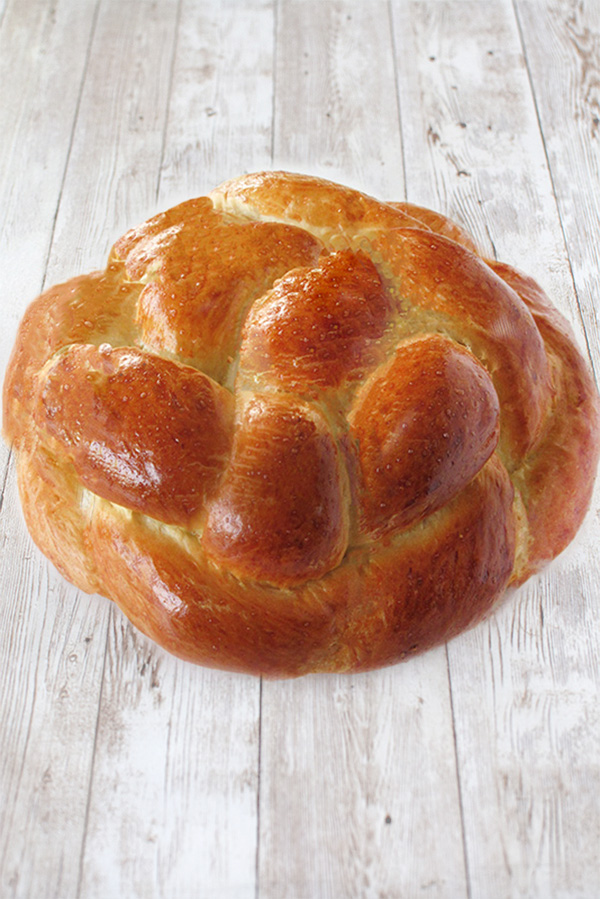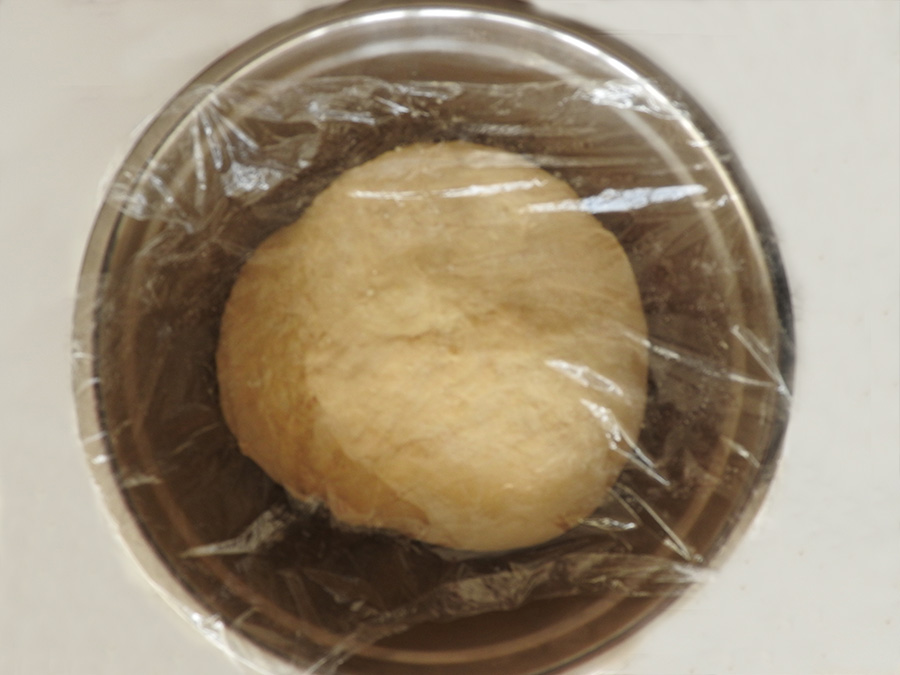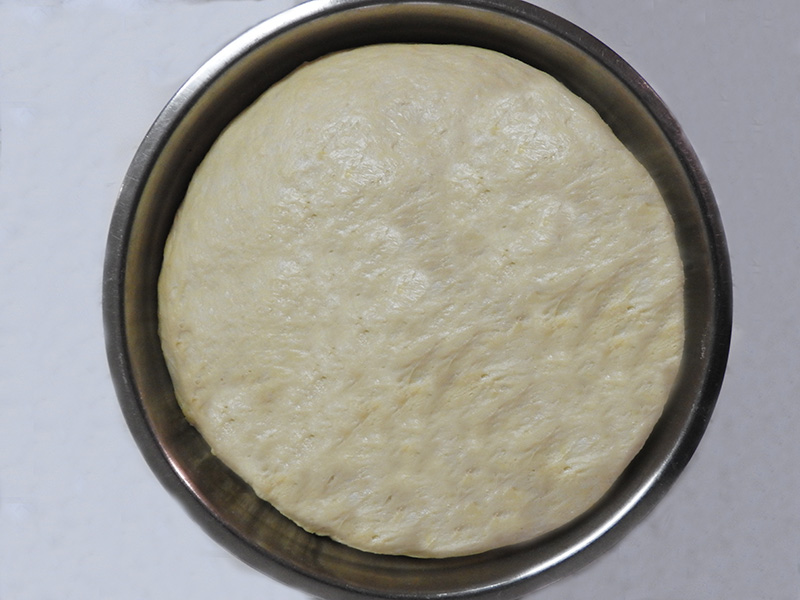This Fluffy Challah recipe is an easy recipe for delicious and fluffy Jewish challah bread with only 6 ingredients.

Challah, a braided bread, is eaten primarily on Shabbat and on Jewish holidays. Two challahs should be present at each traditional meal during these days. https://aish.com/six-facts-about-challah/
I tried many challah recipes. Some came out good, some not. Every week, my family had no idea what to expect. It wasn’t the recipe, it was me. I just couldn’t get the hang of making great challahs week after week.
With this Fluffy Challah Recipe, I have yet to mess them up even once after all these years.
It may look like a complicated recipe because of the steps, but it is actually very simple to make. The longest step of the whole process is waiting for the dough to rise!
…. and the outcome is SO fluffy and SO good that you may never want to bother to buy rolls from the store again!!
Prefer water challah bread? Fluffy Water Challah Bread
Want to make fluffy challah bread without egg? Fluffy Challah Bread Without Eggs
A little background
Every once in a while, I will come across something that looks easy enough for me to say, “I can do that,” and I will try.
This is true for crafts, sewing, cooking, and baking, and I will often try…and I will keep trying until I am satisfied that I’ve mastered whatever-it-is or accept that I just am not going to.
Well, one of those things, years ago, was challah.
I got a recipe from a friend and decided to try.
Now, I am one of those people who will often look at instructions if I need to, and sometimes, I follow them “kind of.”
My kids have shown me buttons and options on appliances and electronics that I have been using for years and never even noticed.
More often than not, I cook by “how it looks” and have been caught measuring salt and spices with the palm of my hand.
I am embarrassed to say, that once my daughter caught me even about to measure oil this way.
“You are NOT going to measure oil in your hand. Are you??”
Well, let me tell you right now, I never did THAT again.
One may be able to get away with this behavior with cooking – you know, adapt the ingredients to taste or throw in what looks good – but not so much with baking.
Yeah, I found that out the hard way with the challahs.
Week after week I tried, but instead of coming out fluffy, they came out flat. I mean, they were closer to being flat pita than they were fluffy challahs.
Finally, I would give up, and I think that everyone was grateful to have the store bought once again.
However, every once in a while, I would try again. It would be hit or miss as to how good they came out.
Then, one day, it hit me. The instructions often will tell you how long to let the dough rise, or they will say to let it “double in size” both before and after forming the challah.
However, me being the logical person I am, I thought, If the formed, but raw, challahs are fluffy at double the size, wouldn’t they be fluffiER if I let them rise more?
The short answer to that is…NO! While the raw challahs look nice and large, when they are in the oven, they will FALL.
Now, my challahs never fail. I make them now pretty much every week and even bake them for my parents. They always come out good, and my family loves them (once I used store-bought because I didn’t have time, and everyone was disappointed).
THAT is how you know you are doing a good job!
Another point: instructions will also often say how long to knead the dough. I have NEVER followed these. I use a stand mixer (easier and more efficient than kneading by hand) and just knead for a few minutes past the point when the dough is smooth and like a slightly sticky Play-Doh).
Making good challahs doesn’t take a baker. All one needs is a good recipe and to pay attention.
After all of my kitchen blunders over the years and being convinced that I would never get it right no matter how much I tried, my motto is, If I can do it, anyone can.
And with this recipe…anyone can!
Are challahs traditionally dairy or non-dairy?
Challahs are traditionally non-dairy. This is because they are for Jewish occasions, which mostly include meat meals, and Torah-observant Jews do not eat meals that combine meat with milk.
Braided challahs are mostly used on Shabbat or at an event like a wedding, bris, or bar mitzvah. However, round challahs are traditionally used for holidays. (There is no absolute rule to this.).
Even challah made with eggs is not dairy. Contrary to what some people believe, eggs are NOT dairy (you cannot milk a chicken).


For fluffier challah, should I let the braided dough rise more than double?
This is an absolute, hard NO. It’s not so important for your dough to have risen exactly double – it’s just an approximation. However, as I mentioned in the background section above, if it rises too much, it can fall when baking. Over-rising can also cause the dough to be bitter and taste like beer from the over-fermenting of the yeast.
Can I freeze?
Absolutely YES. Just make sure to wrap or bag well, because otherwise it can become freezer-burnt.
Are challahs traditionally dairy or non-dairy?
Challahs are traditionally non-dairy. This is because they are for Jewish occasions, which mostly include meat meals, and Torah-observant Jews do not eat meals that combine meat with milk.
Braided challahs are mostly used on Shabbat or at an event like a wedding, bris, or bar mitzvah. However, round challahs are traditionally used for holidays. (There is no absolute rule to this).
Contrary to what some people believe, eggs are NOT dairy (you cannot milk a chicken).
This Easy Fluffy Challah Bread recipe does not call to proof the yeast. Why not?
Proofing (or blooming) the yeast is only to be certain that the yeast is still active and your challah will rise. Proofing is when you take your yeast, a little warm water, and a little sugar and mix them together.
If you are concerned that your yeast may no longer be active, then certainly proof it before using.
If your yeast is active, it will normally bubble within 5-10 minutes. If you don’t see it in that amount of time, I would wait longer just in case before you throw it out (especially if you buy large bags like I do).
If you proof your yeast for this recipe, you should use water and sugar from the quantities that the recipe already calls for.


For fluffier challah, should I let the braided dough rise more than double?
This is an absolute, hard NO. It’s not so important for your dough to have risen exactly double – it’s just an approximation. However, as I mentioned in the background section above, if it rises too much, it can fall when baking. Over rising can also cause the dough to be bitter and taste like beer from the over fermenting of the yeast.
Can I freeze?
Absolutely YES. Just make sure to wrap or bag well, because otherwise it can become freezer-burnt.
How simple is it to make Fluffy Challah?
While the list of instructions is long and the start-to-finish time is long, the bottom line is that Easy Fluffy Challah Bread takes minimal effort. All you do is mix the ingredients, let sit to rise, form the challahs, let rise again, coat with egg yolk (and add toppings if you like), and bake. That’s it!
Fluffy Challah Recipe

Easy and delicious, fluffy challah bread.
Ingredients
- 8 cups (1 kg) flour
- 3 eggs (two for the challah and one to coat)
- 1/2 cup oil
- 1/2 cup sugar
- 3 tablespoons instant dry yeast
- 1 tablespoon salt
- 1 1/2 - 2 cups warm water
- sesame seeds, poppy seeds, etc for topping, if desired
Instructions
- Pour flour into large bowl (I sift first).
- Add oil, sugar, salt, two eggs, and yeast.
- Mix with mixer or knead by hand, adding water a little at a time until the dough has become like a slightly sticky Play-doh and then mix for a few more minutes.
- Cover bowl with plastic wrap (you can use a damp cloth towel, however if the dough rises to that point, it will stick to the towel).
- Let rise until the dough approximately doubles in size (it doesn't have to be exact).
- Remove dough from bowl and place on a lightly floured surface (the stickier your dough, the more flour you will need, because you want to be able to work with it without it sticking to your work surface).
- Divide into 6 equal parts (if you want two three-strand challahs). For exact measurements, use a scale to weigh the the parts.
- Roll out the parts into 6 ropes to a diameter of approximately 3/4 - 1 inch and of equal length (the ends should be a little pointed so that they can be pinched easily at the ends).
- Pinch the ends of three of the ropes together and braid. Then pinch the other ends together to close.
- Tuck the pinched ends underneath the challah.
- Place the challah on a cookie sheet that has been lightly coated with oil or spray (I use baking sheets).
- Repeat steps 9 - 11 for the other three ropes.
- Beat remaining egg and brush over challahs.
- Let the challahs sit to rise until they have approximately doubled in size (it doesn't have to be exact, but do not let them rise too much as they may fall when baking).
- Place in oven on a middle shelf that has been pre-heated to 350°F.
- Bake for approximately 30 minutes or until they browned somewhat (at least a light golden brown). If you need to, swivel the cookie sheet around after approximately 15 minutes for more even baking.
- Remove from oven and let cool.
Notes
1) If you want a more yellow color to the rolls like you find in he bakeries, add a little turmeric (too much and it may taste like soap) or a little yellow food coloring. 2) If you are not certain your yeast is active, proof first by mixing a little warm water with a couple of tablespoons of the sugar and the yeast. Let it sit for around 10 minutes for it to bubble. Then, pour it in to the mixing bowl and mix with the rest of the ingredents before you add the remainder of the water.
Nutrition Information:
Yield:
12Serving Size:
1Amount Per Serving: Calories: 157Total Fat: 12gSaturated Fat: 1gTrans Fat: 0gUnsaturated Fat: 10gCholesterol: 47mgSodium: 551mgCarbohydrates: 10gFiber: 1gSugar: 8gProtein: 3g
Joanne Given
Wednesday 15th of May 2024
Can seltzer be used in place of some of the water?
Lori
Wednesday 15th of May 2024
That is a great question! I've never tried seltzer instead of water, just regular tap or filtered. I know that some people use seltzer for extra fluff, but that is not needed here, because of the yeast. If you try it, I'd love to hear if it had any effect. Thanks!